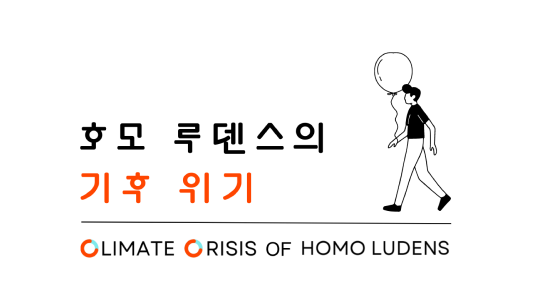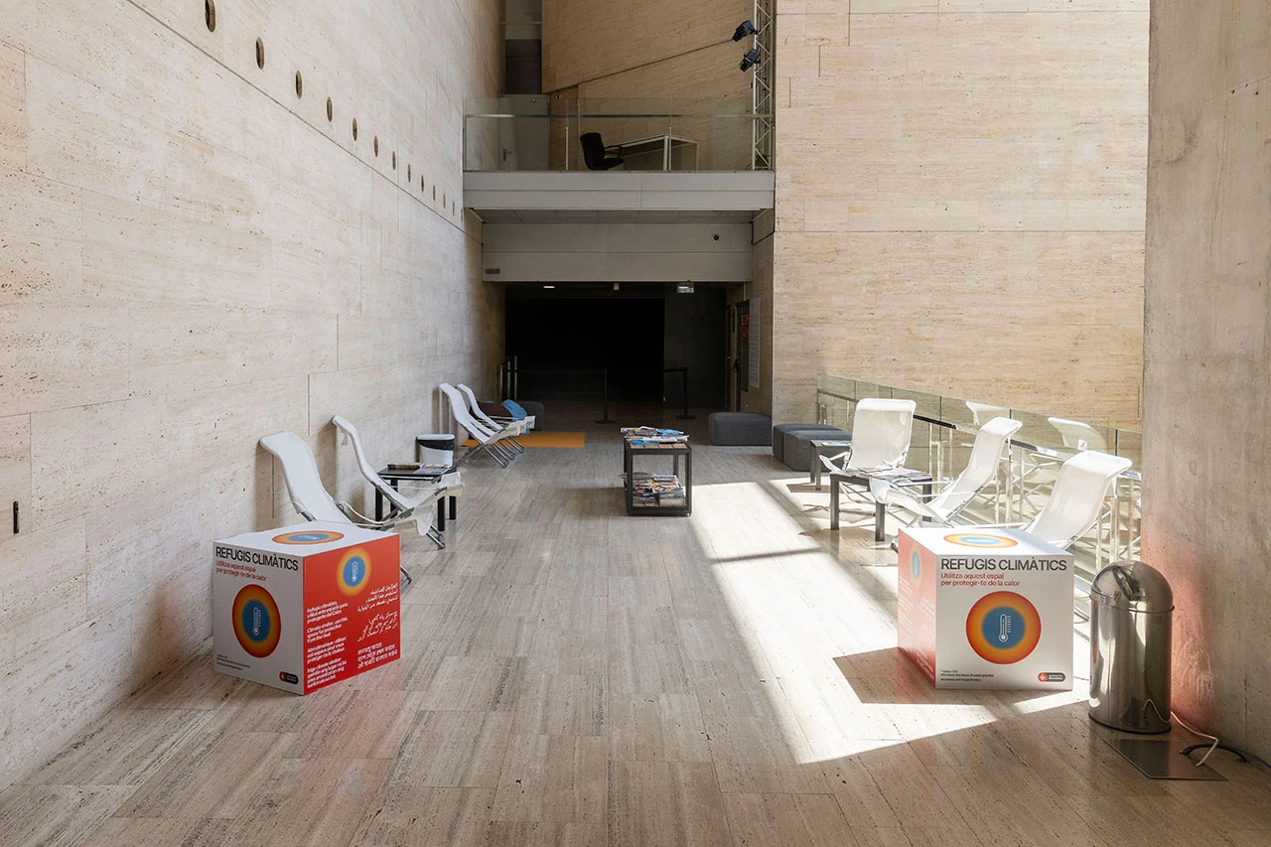In South Korea, “Climate Change Week” is observed annually, beginning on April 22, Earth Day. The event is hosted by the Ministry of Environment and runs for one week. This year’s slogan was, “Our carbon-neutral lifestyle—actually, we love it!” However, aside from the 10-minute nationwide lights-off campaign held at 8 PM, government-led presentations on carbon neutrality policies and practices by the Ministry of Environment, and various campaigns and challenges organized by local governments or educational institutions, it is no exaggeration to say that there are few programs that truly help citizens engage in a fun and accessible way. While introducing and promoting the diverse policies and initiatives being implemented by public institutions is certainly important, it is equally meaningful to create participatory spaces where individuals and groups from civil society can share and practice the efforts they have independently pursued for a sustainable society. In this respect, there remains a sense of disappointment in how Korea’s “Climate Change Week” is currently structured.
Against this backdrop, one country has drawn attention not only by renaming its “Climate Action Week” campaign, but also by transforming it into a festive and engaging platform for practicing sustainable green living. From mid-June to July 14, 2024, Singapore launched a nationwide environmental movement called “Go Green SG.” “Go Green SG” was introduced in 2023 as a rebranding of the former Climate Action Week, with the aim of encouraging greater public participation. Since its inception, the event has provided an opportunity for individuals and groups across Singapore—with diverse interests related to climate change mitigation and adaptation—to share their green practices and inspire wider involvement. In doing so, it contributes to shaping a more sustainable future for Singapore. The campaign has evolved into a dynamic celebration, where a wide array of sustainable and carbon-neutral programs are carried out not only by public and private organizations but also by local communities and civil society groups. These programs are designed to permeate everyday life during the campaign period, turning the climate action initiative into a community-wide festival. In this article, we will explore the government policies that form the foundation of Go Green SG, examine the campaign’s role and significance, and highlight specific examples and achievements. Through this, we hope to reflect on the meaning of public–private cooperation in responding and adapting to climate change.
What Policy Framework of the Singapore Government served as the Foundation for the launch of Go Green SG?
Singapore Green Plan 2030 & GreenGov.SG
In addition to the ‘Public Sector Sustainability Plan 2017–2020 (PSSP)’, introduced in 2017 to promote environmental sustainability, and the implementation of the Carbon Pricing Act in January 2019, Singapore announced the ‘Singapore Green Plan 2030’ in February 2021. This plan sets out to achieve net-zero emissions and sustainable development. The Singapore Green Plan 2030 aims to reach peak carbon emissions around 2030 and reduce them by half by 2050, ultimately achieving net-zero emissions. It focuses on realistic and feasible measures for Singapore, such as expanding the use of solar energy—the most viable renewable energy source for the country—reducing waste and water consumption, and building infrastructure to support electric vehicles.
Singapore Green Plan 2030 aims to promote a Green Government in the public sector and a Green Citizenry in the private sector, fostering collaboration between these two key players. Under this partnership, the plan sets five major focus areas: △City in Nature, △Energy Reset, △Green Economy, △Resilient Future, and △Sustainable Living. Various practical programs and campaigns are being implemented within these areas.
Policies and programs in the public sector are implemented under the “GreenGov.SG” initiative. GreenGov.SG aims to partner with businesses, civil society, and individuals to advance the sustainability agenda, targeting the peak of carbon emissions five years earlier than the national goal of 2030—that is, by 2025. It focuses on achieving a sustainable and green economy.
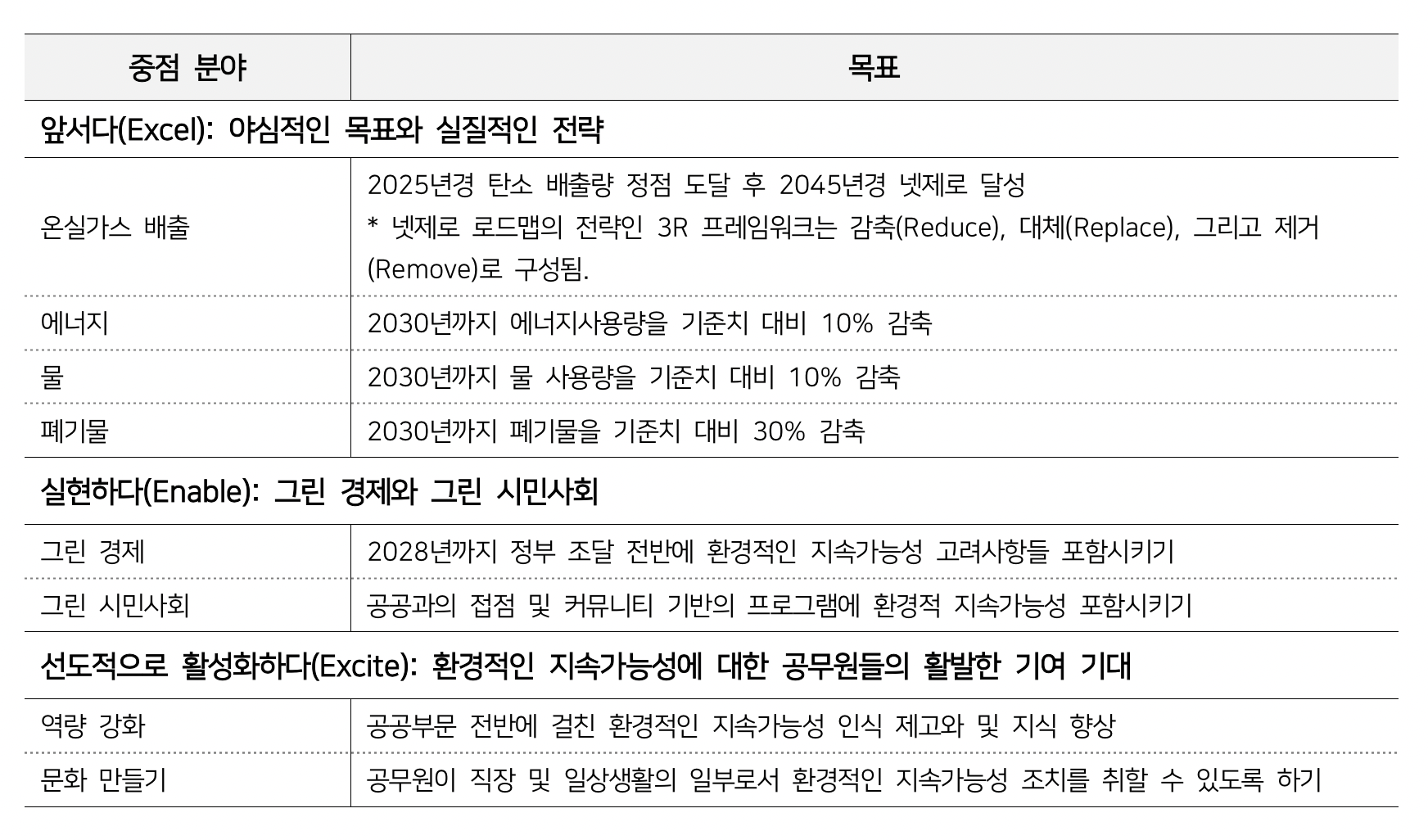
(출처: https://www.greenplan.gov.sg/key-focus-areas/green-government/)
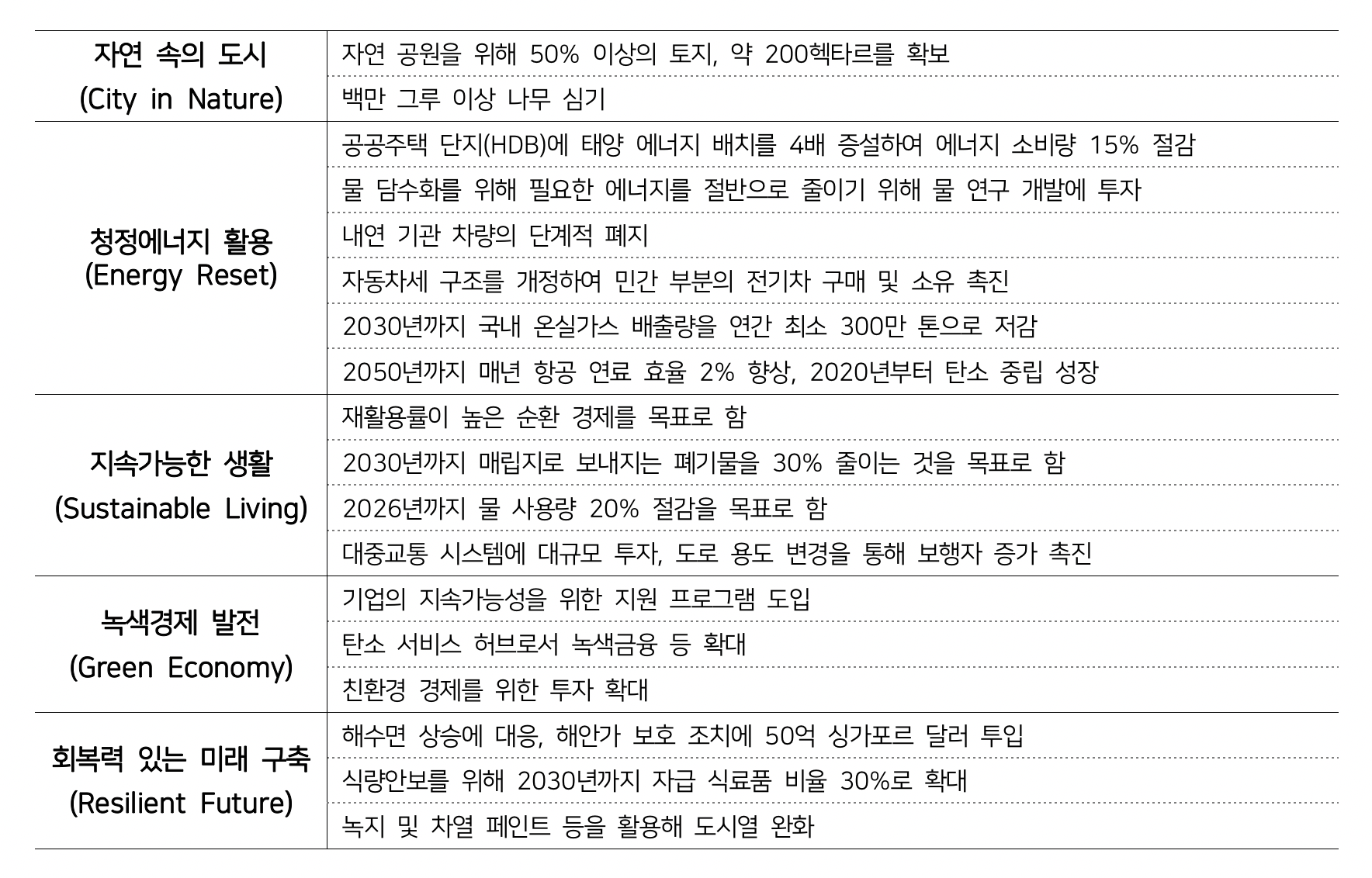
(출처: 국가기후기술정보시스템, 2023)
Meanwhile, in January 2023, the Ministry of Sustainability and the Environment (MSE) established the position of Government Chief Sustainability Officer (GCSO). This role oversees the Public Sector Sustainability Office (PSSO) and the Sustainability Partnerships Office (SPO), and is responsible not only for developing and coordinating public sector strategies in collaboration with public agencies but also for leading partnerships with the private sector. Currently, Singapore’s Government Chief Sustainability Officer is Lim Tuang Liang.
Green Citizenry: Go Green SG
While the Green Plan initiatives carried out in the public sector of Green Plan Singapore 2030 r focus on developing sustainable technologies in collaboration with various stakeholders, the Green Citizenry in the private sector is linked to a range of programs that enable citizens to participate as part of a nationwide movement to tackle climate change.
Activities within civil society include: △The Green Plan Conversations in 2021, where around 60 people from various sectors gathered to discuss with whom, what, and how to collaborate in pursuit of Singapore’s sustainability goals; △The Forward Singapore Exercise in 2022, which involved approximately 3,000 citizens from diverse social backgrounds participating in about 30 sessions to discuss Singapore’s challenges, costs, and trade-offs; △The Go Green SG initiative in 2023; and △The Electric Vehicle Charging Etiquette Workshop in 2024, organized by the Ministry of Transport (MOT) and the Land Transport Authority (LTA), where around 40 participants—including electric vehicle drivers, charging service providers, parking lot owners, and mobility service operators—exchanged perspectives on electric vehicles and held discussions aimed at improving the EV experience.
Go Green SG is a nationwide movement led by the Ministry of Sustainability and the Environment aimed at building a climate-resilient Singapore. This event is a rebranding of the Climate Action Week, which began in August 2019 following the declaration of 2018 as the “Year of Climate Action.” During Climate Action Week, Singapore launched the Climate Action SG Pledge to raise public awareness and introduced over 800 initiatives through a Public-Private-People Partnership (3P2) involving the government, businesses, and citizens. On June 5, 2023, in celebration of World Environment Day, Singapore expanded the duration of Climate Action Week from one week to one month and renamed the event Go Green SG, restructuring it to encourage participation from a broad range of social actors including citizens, businesses, organizations, and communities.
The Ministry of Sustainability and the Environment, the lead agency for Go Green SG, collaborated with public organizations such as the Singapore Tourism Board, Ministry of Education, National Library Board, National Parks Board, and Land Transport Authority to create a variety of engagement programs. Additionally, over 160 private partners organized more than 300 programs in which approximately 70,000 citizens participated in 2023.
Meanwhile, there is also funding support to help private sector actors carry out various activities. Established with a budget of SGD 50 million in 2020, the Singapore Eco Fund (SG Eco Fund) provides financial support to individuals, small groups, organizations, and entities (including companies, charities, government and non-governmental organizations registered in Singapore) to encourage and expand community participation in environmental sustainability-related activities. The Eco Fund is divided into two categories: Sprout and Main. Support is available to individuals (residents of Singapore aged 18 or older who are citizens or permanent residents), small groups (all members must be residents aged 18 or older, with at least one member being a Singapore citizen or permanent resident), and organizations (companies, charities, government and non-governmental organizations registered in Singapore). Sprout grants can be applied for year-round and provide up to SGD 10,000, while Main grants are available once annually between May and August. If applicants meet the evaluation criteria, they can receive funding exceeding SGD 10,000. Participants must undertake projects addressing environmental sustainability, including but not limited to climate change and energy, waste, water, food, nature and biodiversity, environmental pollution, or public health. These projects should promote Singapore’s environmental sustainability and clearly define the community’s role in developing and delivering environmental solutions. They must also demonstrate how solutions can be implemented with consideration for local characteristics and outline the expected lasting impact.
In addition to funding, initiatives have also been launched to support communities in driving sustainability actions. Established in 2022, the Green Action for Community (GAC) initiative was started to empower and enable communities to implement environmental sustainability. It aims to bring together community leaders, residents of various ages, educational institutions, and government agencies to collaboratively plan, organize, and co-execute sustainability initiatives within their communities. For example, in 2023, five GAC projects gained attention. These projects mainly focused on greening various parts of the community, creating everyday items or community facilities from recycled materials, establishing vertical gardens in schools, and finding solutions to reduce waste by using “imperfect” fruits and vegetables rather than discarding them. Meanwhile, in January 2024, the Singapore Government Partnership Office (SGPO) was launched to strengthen partnership relations between the government and civil society.
Go Green SG가 제안하는 지속가능한 교통, 먹거리, 에너지 투어
Go Green SG에서 시민들은 경험하고(GO EXPLORE), 놀고(GO PLAY), 지속가능하게 먹고(GO MAKAN), 자연을 정화하고(GO CLEAN), 의식있는 소비를 하는(GO SHOP) 등의 일상적인 행위들을 체험하고 터득하면서 지속가능한 삶을 체험해볼 수 있다. 2023년에 이어 2024년에도 정부기관, 기업, 비정부기구, 지역사회, 학교 등 다양한 파트너와의 협력을 기반으로 △지속가능한 투어, △워크숍과 강연, △친가족적인 녹색 활동, △지속가능한 소매(Retail)와 식음료(F&B) 그리고 친환경적인 거래(Deals), △친환경 라이프스타일을 위한 이니셔티브 등 다양한 유형의 녹색 프로그램들이 마련되었다.
여기서는 지속가능한 투어 프로그램을 집중적으로 보겠다. 흔히 지속가능한 여행이라면 저탄소 교통수단 이용, 친환경 먹거리, 자연친화적인 장소나 저탄소 산업현장 방문 등을 떠올린다. Go Green SG는 이렇게 지속가능한 여행을 가능하게 하는 것들의 백스테이지를 한 달 기간에 둘러볼 수 있는 익스클루시브한 기회를 제공한다. 평소 일반인에 개방하지 않는 공공장소, 기업 등 녹색 현장을 둘러볼 수 있도록 구성한 점이 특별하다. 또한 그런 활동을 하고 있는 기업, 단체라면 누구든 Go Green SG 기간에 사내 투어 프로그램을 기획해서 참여할 수 있고, 이로써 기업의 녹색활동 홍보도 하고 전 사회적인 녹색 전환을 촉진하는 데 기여할 수도 있다. 2024년 Go Green SG를 통해 시민들이 체험할 수 있었던 프로그램 중 셀레타 버스 차고지 투어, 도시 농장 ComCrop 투어, 그리고 투아스원 발전소 투어와 같은 사례들을 소개하고자 한다.
지속가능한 교통 : 셀레타 버스 차고지 투어
이동과 여행이 어떻게 친환경적으로 변화하고 있는지 살펴볼 수 있는 투어로는 도시국가인 싱가포르의 지속가능한 대중교통을 담당하는 큰 축인 버스 네트워크 관련 투어나 지속가능성 매뉴얼을 실천 중인 숙박업소 투어, 그리고 싱가포르 관광청(STB)과 국립환경청의 프로그램들이 돋보인다. 특히, 육상교통청과 싱가포르의 버스회사 SBS Transit이 협력하여 선보인 셀레타 버스 차고지(Seletar Bus Depot) 투어는 싱가포르가 어떻게 주요 대중교통 수단인 버스 시스템을 녹색화하고 있는지를 체험할 수 있는 프로그램이다.
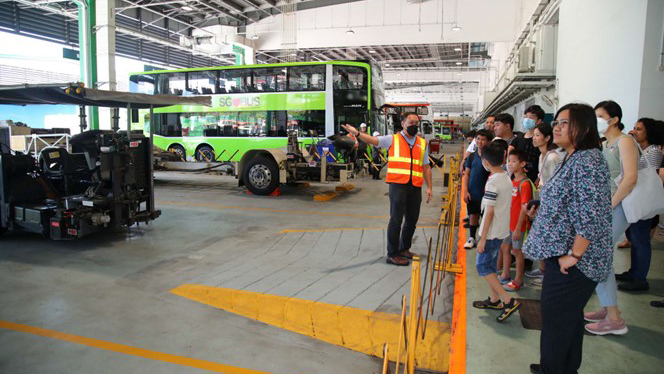
(출처: Go Green SG Homepage)
육상교통청이 싱가포르 내에 세 번째로 만든 버스 차고지인 셀레타 버스 차고지 투어에서는 SBS Transit이 참가자들에게 교육 및 워크숍 시설을 안내하면서 버스 차량들의 유지 관리 및 운영 방법을 소개한다. 셀레타 버스 차고지의 경우, 녹색 지붕이 건물의 온도를 낮춰 에너지 소비를 약 10% 줄이고, 버스 세차장에서는 자동 버스 세차 시스템이 세차 과정에서 사용되는 물의 약 80%를 재활용한다. 버스의 유지보수 작업 시에는 종이 서류 대신 태블릿으로 작업 지침, 도면, 전기 회로도, 부품 정보 등을 확인하고, 버스 제조업체의 포털 내 전자 매뉴얼을 통해서 버스 유지보수와 관련한 상세 정보도 확인할 수 있다. 이러한 작업을 통해 효율성과 물품저장 공간을 개선하고 A4 용지 850장 분량의 종이 사용을 줄이는데 이는 연간 약 27그루의 나무를 보존하는 효과가 있다.
셀레타 버스 차고지 외에도 탄소를 감축하고 자원을 절약하는데 앞장서는 차고지는 또 있다. 싱가포르 최초로 태양광 패널을 설치한 울루 판단(Ulu Pandan) 버스 차고지는 건물 옥상에 2,000개 이상의 태양광 패널이 설치되어 있어서 낮 동안 시설에 전력을 공급하고, 이를 통해 연간 약 840MWh의 에너지를 생산하며, 소비되지 않은 잉여 에너지는 국가 전력망 시스템에 공급하고 있다. 버스 세차 공간이나 옥상 정원에서는 비식용 용도의 물인 NEWater를 사용하여 건물의 온도를 낮추고 에너지 소비를 줄이는 데에도 도움을 주고 있다.
또한 본 투어 프로그램에 포함된 싱가포르 모빌리티 갤러리(Singapore Mobility Gallery, SMG) 투어에서는 보다 스마트한 도시 이동성을 위해 어떤 기술을 어떻게 활용하는지 볼 수 있고, 육상교통청이 어떻게 싱가포르의 육상 교통 시스템을 계획, 설계 및 구축하는지에 대한 비하인드 투어도 할 수 있다.
지속가능한 먹거리 : 도시 농장의 모델을 보여주는 ComCrop 견학 & 시티 스프라우츠 농장 워크숍
싱가포르 북부지역 우드랜즈(Woodlands)에 위치한 도시 농장인 ComCrop은 싱가포르 최초의 상업용 옥상형 농장(Rooftop Greenhouse Farm)이다. 활용할 땅이 부족한 싱가포르의 환경상 활용되지 않는 소외된 공간을 정부의 지속가능 정책에 맞춰 활용할 수 있도록 본래 옥상 주차장으로 사용되던 공간을 개조하여 옥상형 농장으로 만들었다. 2011년 설립된 ComCrop은 해충 방제 및 빛과 그늘 조절 자동화 시스템과 더불어 수경재배 기술을 활용하여 무농약 허브와 채소를 재배하는데, 3천 평방미터 이상의 부지에서 5개의 온실을 통해 한 달에 20톤의 채소(상추, 케일, 바질, 로즈마리, 민트 등)를 생산하고 지역사회에 공급한다.
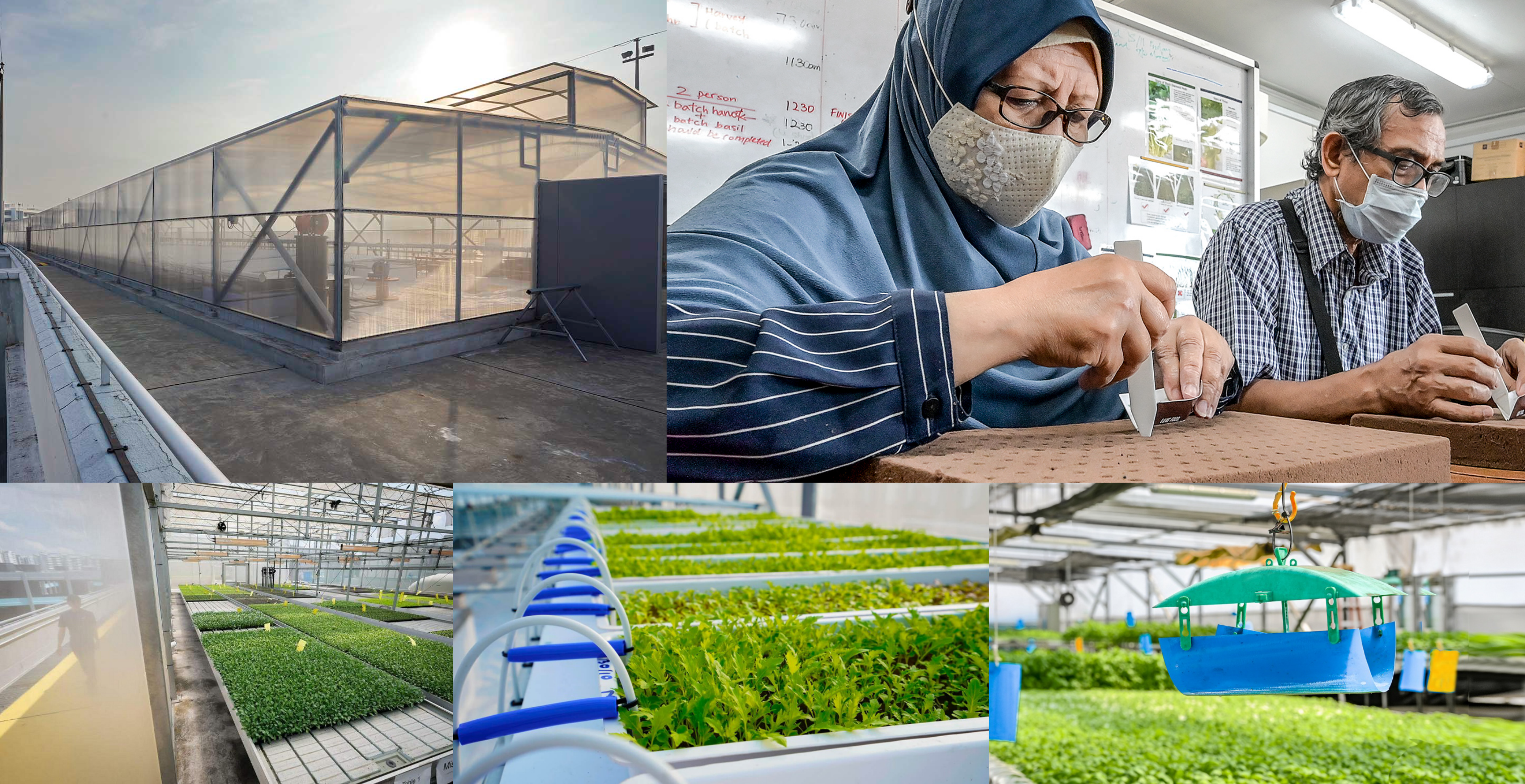
(출처: ComCrop Hompage & JTC Webpage)
* 주롱도시공사(Jurong Town Corporation, JTC)는 싱가포르의 산업단지 개발 및 관리기관이다.
무엇보다 인공 조명과 더불어 자연 태양광을 사용하는 도시농업의 하이브리드 모델을 제시하고 있고, 에너지 비용면에서도 실내 농장보다 비용이 절감된다는 이점이 있다. ComCrop은 노인인구를 포함한 다양한 연령대의 지역사회 구성원들이 정규 채용 외 인턴십과 자원봉사의 형태로 협력체제를 이루어 현지의 노동력으로 지역 농업공동체를 지원하고 있을 뿐 아니라 현지에서 생산하고 소비하는 지속가능한 방식의 농업 및 식량공급 형태를 보여주는 사례로 평가받고 있다.
CEO인 피터 바버(Peter Barber)에 따르면, Go Green SG를 통해 이 투어를 기획하고 농장을 개방한 이유는 현지 농장이 어떤 일을 하고 있고 앞으로 무엇을 더 할 수 있는지 사람들이 알 수 있도록 하기 위함이라고 한다. 그리고 이 투어는 그의 바램대로 현지에서 생산한 신선한 농산물이 어떻게 슈퍼마켓으로 보내지는지 보다 잘 이해하는 것을 넘어, 싱가포르의 식량 회복력과 식량안보를 보장하는 새롭고 지속가능한 농업이 실현되는 풍경을 엿볼 수 있는 기회의 장이기도 하다. 이 도시 농장은 식량안보 측면에서도 기대를 받고 있다. 채소 수입국 중 한 곳에서 살충제 문제가 발생하여 시장의 공급부족 현상이 일어날 경우를 대비하여 하루 40-50kg의 채소를 생산할 수 있는 역량을 갖추고자 하고 있기 때문이다.
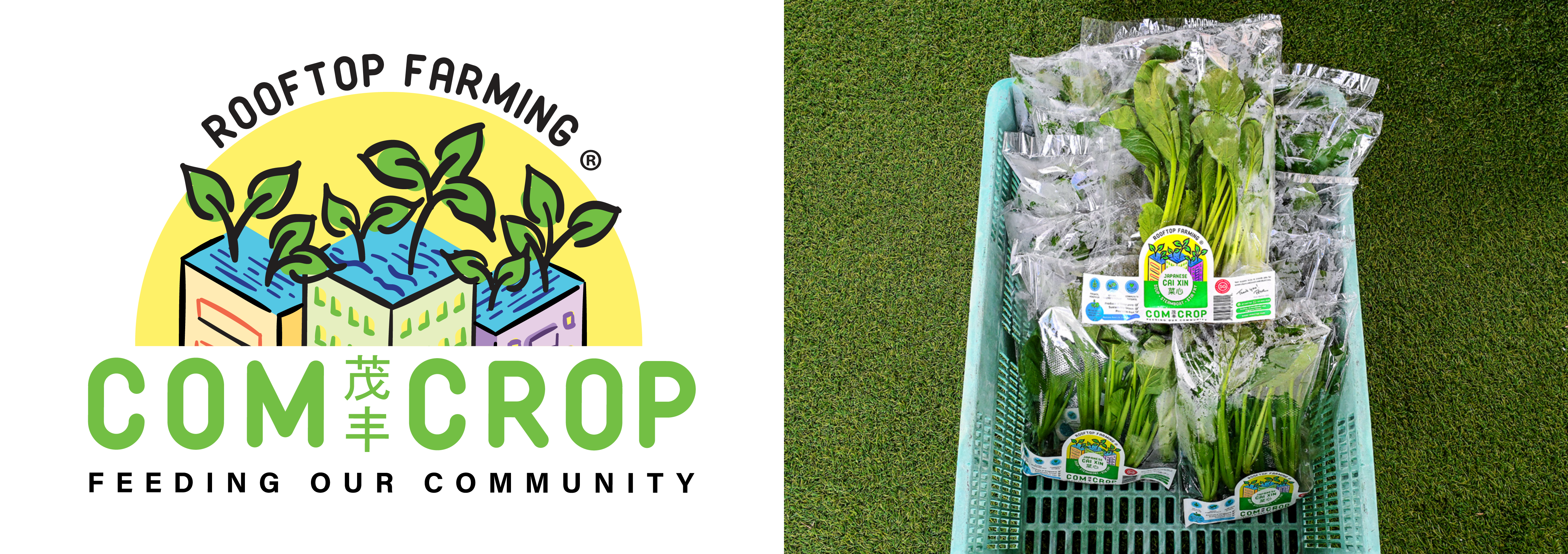
(출처: ComCrop Homepage)
한편, 시티 스프라우츠(City Sprouts)가 기획한 농장 투어 겸 쓰레기의 재사용 방법을 알려주는 워크숍은 가족 특히 어린이 친화적인 투어이다. 논과 밭에서 경작하는 전통적인 농법에서부터 수경재배(Hydroponics), 아쿠아포닉스(Aquaponics3)) 등 현대적인 농업 기술에 이르기까지 다양한 농법을 알아보고, 각종 폐기물을 지속가능한 방식으로 단순 처리하거나 퇴비화하는 방법 외에도 지렁이를 활용하거나 음식물이나 분뇨 등의 쓰레기를 에너지로 바꾸는 바이오다이제스터(biodigester) 기술 등의 방법도 체험할 수 있는 기회를 제공한다.
그 외에도 식량안보와 지속가능한 생태계의 중요성에 대한 교육 프로그램과 업사이클링한 시리얼 박스 로봇인 쇼앤텔(show-and-tell)로 하는 보물찾기 프로그램, 그리고 어린이들이 직접 심은 씨앗을 집으로 가져가서 키워봄으로써 식물의 성장 과정에 대한 이해를 돕는 프로그램도 있다.
지속가능한 에너지: 폐기물을 에너지로 전환하는 ‘TuasOne’ 발전소 투어
이 현장 투어는 2021년 12월에 가동된 미쓰비시 중공업 소유의 싱가포르 최신 에너지 폐기물 발전소인 투아스원(TuasOne) 발전소가 일상적으로 어떤 업무를 어떻게 수행하는지 지켜볼 수 있는 일종의 비하인드 투어 형식을 취한다.
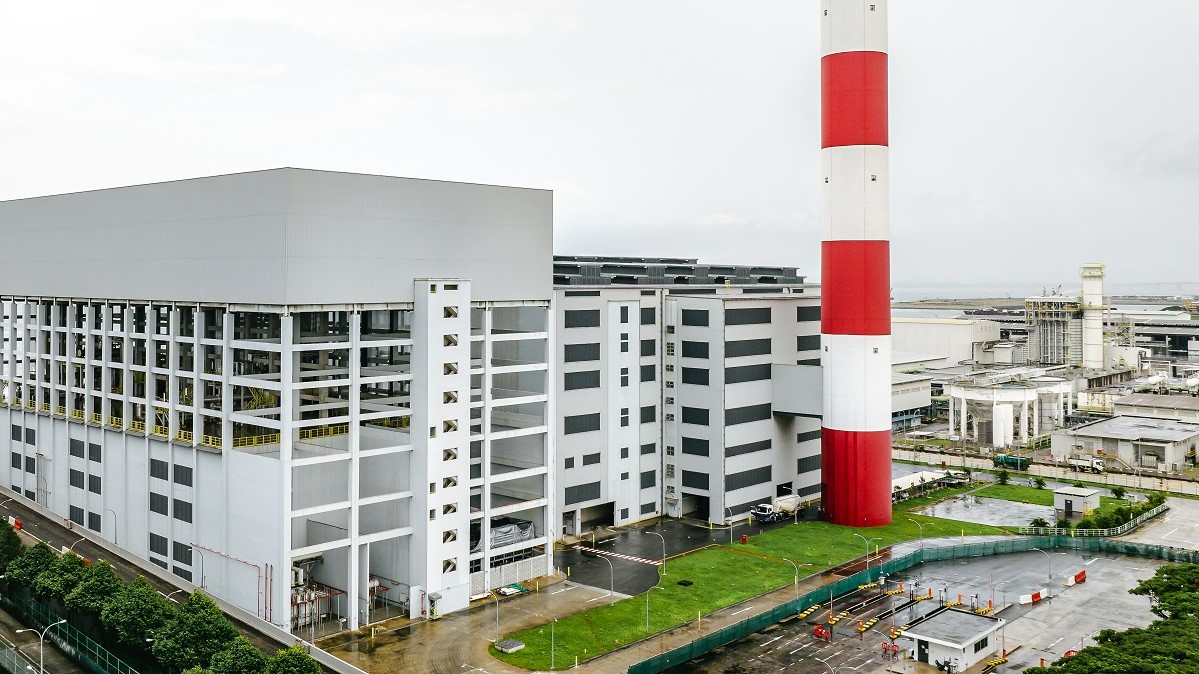
(출처: Go Green SG Homepage)
투아스원은 매일 약 3천 6백 톤의 폐기물을 소각한 후에 싱가포르 본토에서 약 30㎞ 정도 떨어진 세계 최초의 바다 위 인공섬이자 쓰레기 매립지인 세마카우 매립지(Semakau Landfill)로 보내는 역할을 한다. 이 과정에서 발생하는 열은 에너지로 변환하여 매일 120MW의 전기를 생산하는데, 이는 4개의 방이 있는 아파트 약 24만 채에 전력을 공급할 수 있는 양이다4). 해당 투어는 싱가포르가 폐기물을 관리하는 방법에 대해 투어 참가자들이 보다 잘 이해할 수 있는 계기가 되기를 바라는 기대가 담긴 투어이자 싱가포르의 쓰레기 활용안에 대한 정보를 준다.
Go Green SG 운동의 성과
싱가포르의 지속가능환경부에 따르면, Go Green SG는 그 전신인 기후행동주간부터 시작해서 매해 참여율과 영향력이 커지고 있다. 2020년(2020.08.15-21)에는 27개 파트너와 30개의 이니셔티브, 2021년(2021.07.12.-18) 63개 파트너와 130개의 이니셔티브, 그리고 넷제로 미래를 향해 나아가겠다는 주제로 진행된 2022년(2022.09.19.-25)에는 80개 파트너와 130개 이니셔티브가 참여했다.
“녹색 미래 사회를 실현하기 위해서는 모든 시민들이 생활 방식을 바꾸고 지속가능한 생활 습관을 실천해 나가야 한다. 대중교통을 더 많이 이용하거나, 가정에서 에너지 소비를 줄이거나, 재활용에 보다 많은 노력을 기울이는 등의 모든 행동이 환경에 의미 있는 영향을 미칠 수 있다.”
– 부총리 겸 재무부 장관인 로렌스 웡(Lawrence Wong), 2023년 6월 30일 Go Green SG 오프닝 연설에서 인용 –
2023년 7월 한 달간 시민 활동에 참여한 파트너는 2022년의 2배인 160여 개에 달했고, 이들 파트너들이 조직한 프로그램도 2022년 대비 2배 이상인 300개 이상이었으며, 약 7만 명의 싱가포르 시민이 참여하는 등 높은 호응이 있었다. Go Green SG 2023의 그린 국가 서약(Green Nation Pledge5))에도 500개의 교육기관과 조직에서 2만여 명의 개인과 27만 명 이상의 학생 및 교직원이 참여했고, 정부기관들도 100% 참여했다. 지속가능환경부 장관에 따르면, Go Green SG 활동 이후 실시한 설문조사 결과 90% 이상의 참가자들이 관련 활동을 통해 지속가능한 일상을 영위하는 데 영감을 받은 것으로 나타났다.
한편, 2023년에는 총 77개 프로젝트에 SG Eco Fund의 기금 240만 달러의 자금이 투입되었고, 2020년에 5천만 싱가포르 달러 규모의 기금이 출범한 이래 폐기물 감소 및 재활용, 지역사회 내 식량 재배, 생물다양성 보존 등의 주제와 관련한 200여 개의 프로젝트에 30만 명 이상이 참가하고 총 930만 달러의 자금이 사용되었다.
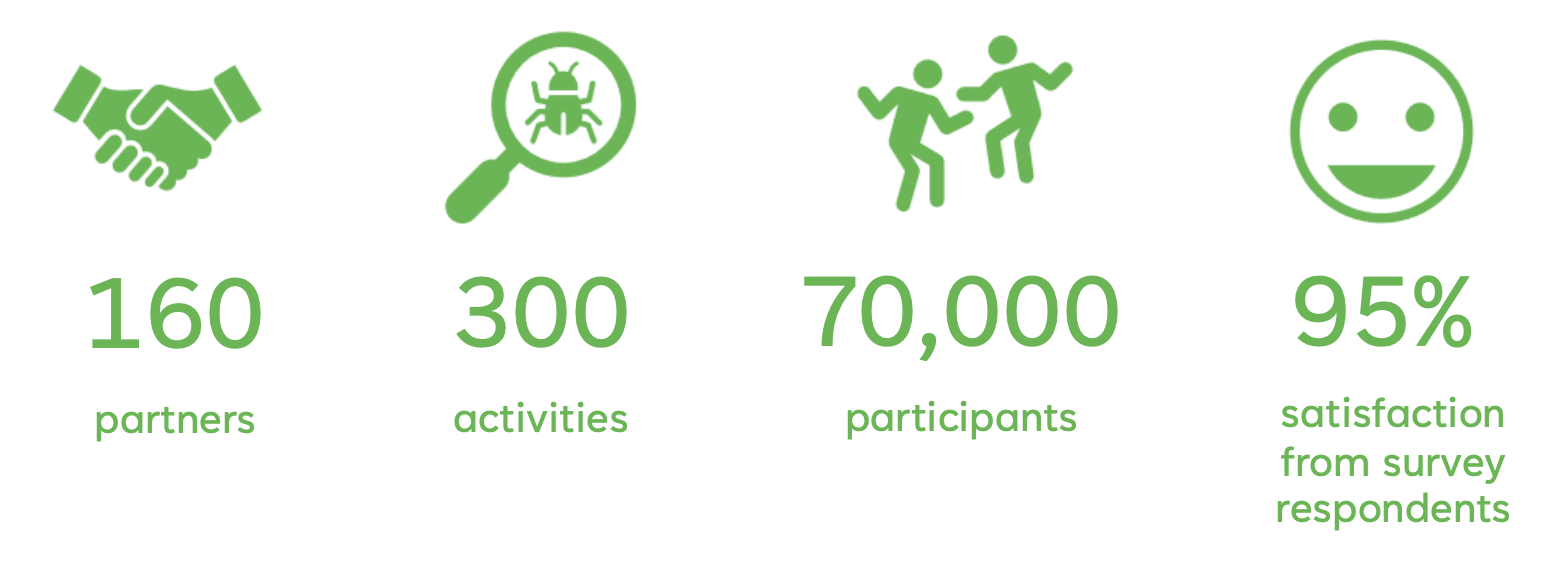
(출처: MSE, 2024)
각주
- While S. Korea calls it Climate Change Week, Singapore refers to it as Climate Action Week.
- The 3P sectors are united through the Climate Action SG Alliance.
- The aquaponics method supplies organic matter and waste from farmed fish or aquatic animals as nutrients for hydroponically grown plants, while simultaneously purifying the water in the process.
- Singapore recycles about 58% of the more than 20,000 tons of waste generated daily, while approximately 8,400 tons are incinerated and transported to the Semakau Landfill. The landfill is expected to reach full capacity by 2035.
- The Green Nation Pledge is a call to action launched on September 19, 2022, by the Ministry of Sustainability and the Environment, encouraging individuals, educational institutions, and organizations to advocate for and contribute to Singapore’s environmental sustainability goals. This pledge is also part of the public sector’s commitment to accelerate the government’s green transition target by achieving net-zero emissions around 2045—five years earlier than the original 2050 goal.
참고문헌
- JTC (2019.02.27.) Rooftop Farms around Singapore: Comcrop’s vision to harvest new ideas.
- MCCY (2023.07.19.) Forward Singapore (Steward Pillar): Rallying Singaporeans to Take Collective Actions for Environmental Sustainability.
- MSE (2020) List of Climate Action Week Events – Annex.
- MSE (2021) Climate Action Week Highlights – Annex B.
- MSE (2022) Climate Action Week 2022: Towards a Net Zero Future.
- MSE (2023.12.) Green Gov SG Report for Financial Year 2022.
- MSE (2023) Green Action for Communities – Annex C.
- MSE (2024.03.25.) Written Reply to Parliamentary Question on engaging community sustainability.
- SBS Transit: Green Efforts.
- Singapore Green Plan 2030 Official Homepage.
- Singapore Go Green SG Official Homepage.
- 국가환경산업기술 정보시스템 (2023.11.22.) 싱가포르, 그린 플랜 2030을 기반으로 지속 가능성 분야 강화.
